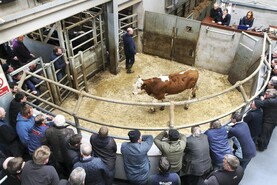For 2019, all BDGP participants will be issued with a selection report in the second half of January. This selection report will contain details of the animals selected, the current tag supplier, details of how to make changes to the selected animals and an option to defer selections.
Tags are expected to start arriving on farms in the second half of February. Tags will be sent out to farmers over a six-week period, with most tags expected on farms by the end of March.
If a herd owner wishes to wait to have their 2019-born animals included in the selections, they will have an option to defer getting tags until the end of April. Any herd wishing to receive tags at the beginning of the sampling period should go online and make any changes to their selections or indicate that they are happy with their selections.
Where a farmer does not amend the selected animals online or indicate that they are happy with the selected animals, ICBF may amend the selection where higher-priority animals are born/purchased into the herd. A herd owner can choose to change their tag supplier up to the date indicated on the selection letter.
2018 tags
Meanwhile, ICBF has issued a reminder to farmers participating in the BDGP to return their 2018-issued tissue tags. According to ICBF, recording screens are available on the ICBF website to record traits for 2018. All survey data – either online or paper – along with tissue tags must be returned as soon as possible to avoid any delay in the 2018 payment.
If replacement sample kits are required in the case where animals have left the herd or animals are unable to be sampled, farmers should contact ICBF ON 023-883 2883.
Bimonthly genetic evaluations to commence from January
ICBF has recently announced that genetic evaluations will now be published bimonthly, commencing in January 2019. This will mean genetic evaluations will be published six times annually in January, March, May, July, September and November. Previously, they were published three times – in April, August and December.
ICBF receives data on a daily basis that can inform genetic evaluations and increase the reliability of EBI and €uro-Stars, which in turn can better inform breeding decisions. Farmers who performance-record and genotype their animals can expect to see information reflected in the indexes of their animals as quickly as possible.
Commenting on the announcement, Dr Francis Kearney of ICBF explained: “This wait could have been several months in the past. As the volumes of data being included in each evaluation will be less, it is anticipated that the average potential changes to an animal’s index based on new data will be reduced compared to the current schedule.
“With more evaluations, there will also be less of a wait time for the next publication where the previous deadline was missed”.
Table 1 outlines the publication dates for submission of data and genetic evaluation runs in 2019.






 This is a subscriber-only article
This is a subscriber-only article










SHARING OPTIONS: